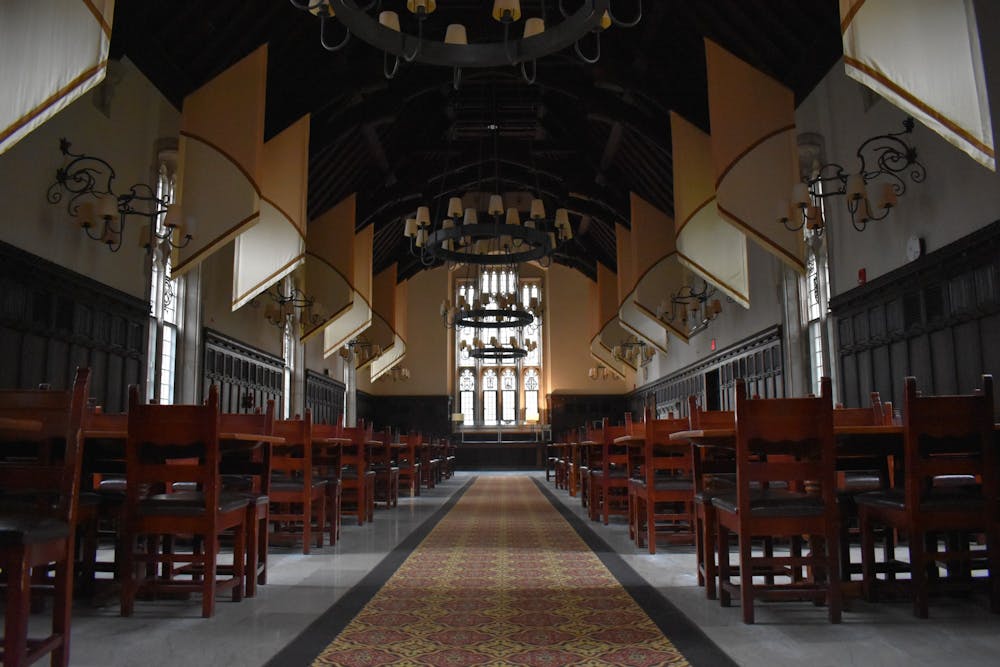National Eating Disorder Awareness (NEDA) Week, which is meant to educate the public and end the stigma around these illnesses, came to a close this Sunday. As the week approached, I was pleased to see an email from my Director of Student Life (DSL) arrive in my inbox about Counseling and Psychological Services’ (CPS) outreach surrounding this topic. Despite the prevalence of eating disorders among teenagers and young adults, my high school never acknowledged NEDA week, so I was particularly grateful for Princeton taking this initiative.
As someone who knows firsthand just how dark and lonely it feels to struggle with an eating disorder, I felt a sense of comfort in knowing the University wanted to raise awareness about this subject, especially given the more challenging virtual format in which these events had to be held. While I appreciate the University’s efforts, however, they left much to be desired. I believe the University could improve its approach to NEDA week both by hosting more events and by publicizing these events in a more engaging and impactful manner.
The email from my DSL was the only email I received from the University regarding NEDA week. It contained information for three Zoom events. The first two, titled “Finding Balance With Food & Eating During COVID” and “Expanding Queerness Through Food,” were hosted by CPS’ Eating Concerns team, and were scheduled during NEDA week. However, both of the events were scheduled on the same day, Feb. 24, hindering their impact. Spreading them out across the week would have furthered the goals of NEDA week by continually bringing awareness to the subject. Furthermore, it could have allowed more students to engage with the programming, as I personally could not attend either event.
The third event mentioned in the DSL’s email, “Coyolxauhqui and the Fragmented Muxer: Colonialism, Eating Disorders, and the Goddess Within,” featuring a guest speaker from the organization Nalgona Positivity Pride, is scheduled for Wednesday March 3, which is after NEDA week ended. Though the email notes the event will be co-hosted by the Women*s Center and the LGBT Center, promoting a third event run by an outside organization that occurs during a separate week rings insincere. According to its description, this event promises to delve into the fascinating convergence of eating disorders, gender, and race through the use of “Coyolxauhqui’s — commonly known as the Aztec moon goddess — story.” After examining “how native peoples’ relationship to land and food was disrupted” after “European patriarchal colonialism took dominance,” the group will finish with a healing exercise “using Coyolxauhqui’s image as a guide.” Despite this interesting agenda, placing this event in an email about NEDA week even though it will occur after the fact made it appear more like a haphazard means of expanding the University’s recognition of NEDA week.
In all, I fear that the University’s lackluster outreach efforts prevented it from reaching the number of people that it could have and creating a truly meaningful NEDA week on campus. A singular email promoting virtual events seems to be a meager substitute of what is identified in the email as the “sort of in person outreach event” that the “Eating Concerns team would typically be doing” during this week. Perhaps a follow up email would have been nice to help draw attention to this relevant topic, as emails can often get lost in students’ inboxes filled with countless listservs and Canvas notifications. Though the events inevitably had to take place online, placing posters throughout campus about the events or NEDA week in general would have also been a way to signal the importance of talking about eating disorders, a pervasive form of mental illness that impacts nearly one in 10 people.
Despite my disappointment in the rollout of the University’s NEDA programming, the events offered nonetheless seemed thoughtful. Though I was unable to attend the events myself, according to the email, they both explored intersectionality in disordered eating, a topic of great importance which is often overlooked. The first workshop, “Finding Balance With Food & Eating During COVID” was not only timely, but spoke to the goals of the week — addressing not just people who have or continue to struggle with eating disorders, but a more general audience. In highlighting how the pandemic can be a catalyst for disordered eating, this event proactively approached how to counteract the negative impacts that life in a pandemic can have on our eating patterns. By exploring intersectionality and the impacts of marginalization on mental health, “Expanding Queerness Through Food” also highlighted aspects of disordered eating that are often overlooked.
These workshops seem to be a promising beginning for discussions surrounding eating disorders, but they were just that: a beginning. In future years, it would be great if the University offered several events on different days to maximize its reach among college students with packed schedules. Even smaller efforts such as hanging informational posters or sending reminder emails about the events would also help improve the University’s outreach and spread awareness about eating disorders to the Princeton community. As NEDA week comes to a close, I remain hopeful that in years to come Princeton will increase its efforts so that all students can take part in these critical conversations.
Ava Milberg is a first-year from New York City. She can be reached at amilberg@princeton.edu.








